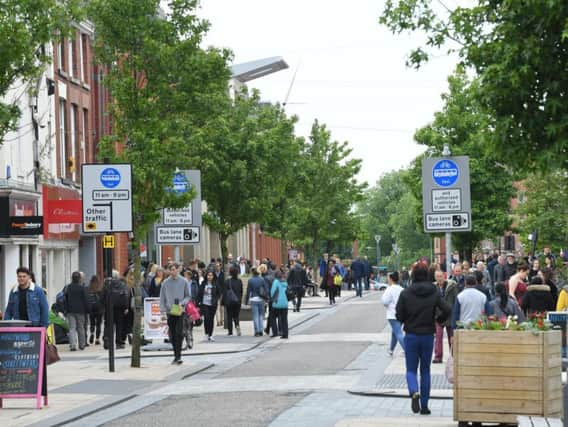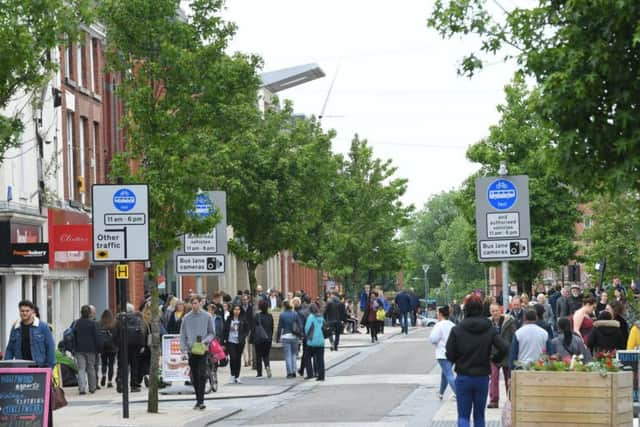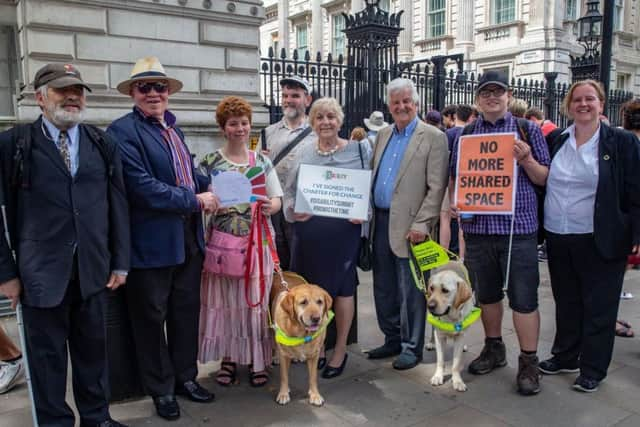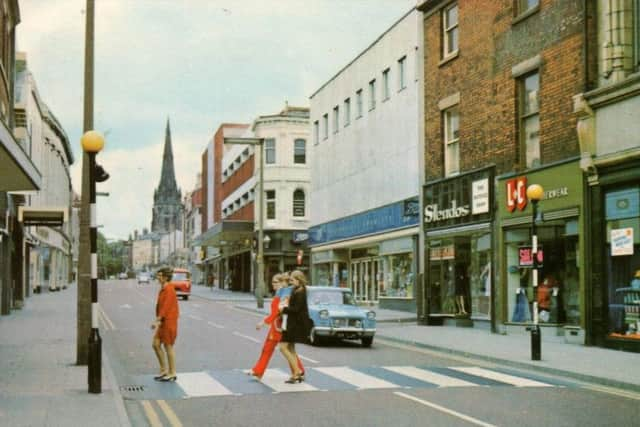Shared-space schemes like Preston's Fishergate are 'dangerous for both car drivers and pedestrians’


The National Federation of the Blind of the UK handed over an epic petition of 430 UK and global organisations, demanding “safe and accessible urban environments for all”.
Among them was visually impaired Preston student David Bromilow, who called for urgent changes to make the city centre safer, particularly for those with disabilities.
Advertisement
Hide AdAdvertisement
Hide AdThe petition was delivered to Downing Street this week as Boris Johnson became Prime Minister.


Shared space schemes are a controversial issue, with motorists and pedestrians saying they can be confusing and potentially dangerous.
Many disabled and visually impaired people say that the lack of recognisable crossings and kerbs can make it hazardous for them.
Guide dogs are said to be confused about where to stop when they encounter a shared space zone - making it dangerous for both drivers and pedestrians.


Advertisement
Hide AdAdvertisement
Hide AdThe pledge and petition was inspired by the Global Disability Summit held in London last year and calls for: “a world where blind, deaf-blind, visually impaired, disabled, young and older people, and people with mobility and cognitive impairments, do not have to share space with moving vehicles on the road.”
The Government has urged councils to have a rethink about shared space schemes. But campaigners have highlighted in particular Fishergate in Preston, the Market Place Scheme in Cirencester and the Kimbrose triangle shared space in Gloucester which still have no controlled crossings in them.
Sarah Gayton, shared space co-ordinator for NFBUK, said: “Shared space roads are dangerous and discriminatory - the deaths in schemes which include a partially sighted pensioner in Coventry in 2012 and a three year old toddler in Jersey by a careless driver in 2016 should clearly illustrate this point.
“All existing schemes require urgent retro-fitting of accessibility feature to keep all pedestrians away from moving vehicles.


Advertisement
Hide AdAdvertisement
Hide Ad“This means putting back controlled green man crossings and putting back proper kerbs.
“Preston, Cirencester and Leicester are just some of the existing schemes which need this to happen, and it is hoped this action will help make this happen.”
Meanwhile, the first phase of the University of Central Lancashire’s masterplan which will include pedestrianising the area around the £60m Student Centre and new civic square will see road closures for two years.
Campaigners acknowledge there are controlled crossings schemed in - but not enoughto ensure equality of access for disabled students accessing a new student services buildingSarah Gayton said: “We have mentioned Preston because of the ongoing problems.
Advertisement
Hide AdAdvertisement
Hide Ad“Fishergate is still an issue and, looking at the UCLan masterplan, we can’t stand by and see the city centre continuing to make mistakes.
“We want all areas to be totally inclusive.”
Coun Keith Iddon, Cabinet member for highways and transport at LCC, said: “Back in 2014, the first phase of this improvement work included changes to the design, following extensive consultation and feedback from organisations representing people with visual impairments.
“Safety has improved on Fishergate since these changes were put in, which was one of our key aims.
“We widened the pavement and narrowed the road space, and since then new shops and cafes have opened along Fishergate.”
Advertisement
Hide AdAdvertisement
Hide Ad"Any changes of regulations around road layouts would be considered to see how they might affect areas such as Fishergate.
"The Fishergate scheme has a clearly defined, narrow road space for vehicles. It has many courtesy crossings with tactile paving to assist people, especially those with visual impairments, and wide pavements.
"This is in contrast with other schemes across the country which do not constrain vehicles in the same way.”
A spokesman for the University said: “In securing planning permission for the Student Centre and the new civic square, the University of Central Lancashire (UCLan) actively sought the views of a wide range of stakeholder groups and their contribution to shaping the University’s plans has been invaluable.
Advertisement
Hide AdAdvertisement
Hide Ad“UCLan continues to work closely alongside Lancashire County Council, Preston City Council, key stakeholders and interested parties to ensure the scheme is accessible and safe for all users, be they students, staff or members of the public.
“As a result of our stakeholders’ beneficial involvement and their specific requests, the raising of kerb heights in excess of those on Fishergate, the inclusion of sufficiently contrasting colours between curbs and pavements, and the introduction of new controlled crossing points will be implemented by Lancashire County Council.
“The University is fully committed to implementing its vision which is to provide a welcoming, inclusive and safe environment.
“The new Student Centre will be a welcoming, functional, focal point for all front line student, visitor and staff enquiries.
“It will also be an important public asset that embraces the city scale and positively contributes to the ongoing regeneration of Preston."
